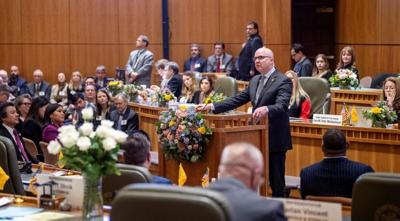In what is anticipated to be a public safety-dominated legislative session, state Supreme Court Chief Justice David Thomson told a joint session of the House and Senate on Thursday the question of what to do about crime is a complex one.
This question reveals the challenges and burdens imposed on the judicial branch, Thomson said, and in today’s world one might just as well ask: What do we do about substance abuse, what do we do about foreclosures, what do we do about child welfare, what do we do about behavioral health?
“The judiciary does not sleep on the courts’ work as a community problem-solver,” Thomson said during the yearly State of the Judiciary address.
“Courts have a front-row seat for the many challenges facing our local communities and work every day to help address these issues with innovative solutions like eviction diversion programs, guardianship programs, specialized dockets for veterans, mental health initiatives and rural justice initiatives.”
Thomson told lawmakers the “number one priority” of the judicial branch in this year’s 60-day legislative session is to secure the funding to increased compensation for judicial employees, which he says lags behind their counterparts in the executive branch by 17.8% on average.
“Not only are judiciary wages noncompetitive with the executive branch, our entry-level employees are paid below the living wage,” Thomson said. “In fact, at our current compensation levels, one-half of our judicial branch employees likely qualify for government assistance programs. This is not acceptable.”
He noted the pay increase would not apply to judges and employees who earn more than $100,000 per year.
“This is our largest ask at nearly $14 million,” Thomson said. Thomson also touched on a the continuously controversial topic of pretrial release, indicating the judicial branch is committed to enforcing the law as it stands now or as it might in the future.
“What we stand by as bedrock principle in our criminal justice system is that the accused are presumed innocent until found guilty,” he said.
“A pretrial deprivation of liberty must be made on the dangerousness of the individual and likelihood they will appear to answer their charges, not on their wealth.”
The Supreme Court has updated it’s approach in the past year, Thomson said. A May 2024 tweak to pretrial detention rules creating automatic holds for defendants who are arrested while on pretrial release has resulted in 2,750 holds across the state since then, he said.
Thomson also highlighted the judiciary’s work toward addressing behavioral health issues through assisted outpatient treatment pilot projects, including one in the First Judicial District which serves Santa Fe, Rio Arriba and Los Alamos counties.
The judiciary’s budget request for the coming fiscal year is $296 million, about 14% more than this year’s $253 million, according to the Administrative Office of the Court.
The request include a one-time $25 million allocation to pay for security upgrades at courthouses over six years and $40 million to implement a new speech-to-text system in courtrooms to provide real-time accurate transcripts of hearings and trials.













(0) comments
Welcome to the discussion.
Log In
All comment authors MUST use their real names. Posts that cannot be ascribed to a real person
will not be moderated.
Keep it Clean. Please avoid obscene, vulgar, lewd, racist or sexually-oriented language.
PLEASE TURN OFF YOUR CAPS LOCK.
Don't Threaten. Threats of harming another person will not be tolerated.
Be Truthful. Don't knowingly lie about anyone or anything.
Be Nice. No racism, sexism or any sort of -ism that is degrading to another person.
Be Proactive. Use the 'Report' link on each comment to let us know of abusive posts.
Share with Us. We'd love to hear eyewitness accounts, the history behind an article.